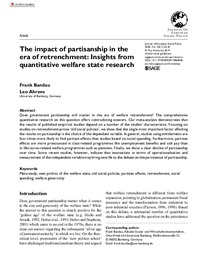The impact of partisanship in the era of retrenchment: insights from quantitative welfare state research

Journal of European Social Policy
2020
30
1
February
34-47
welfare state ; welfare economics ; social policy ; government policy
Social protection
https://doi.org/10.1177%2F0958928719868446
English
Bibliogr.
"Does government partisanship still matter in the era of welfare retrenchment? The comprehensive quantitative research on this question offers contradicting answers. Our meta-analysis demonstrates that the results of published empirical studies depend on a number of the studies' characteristics. Focusing on studies on retrenchment-prone ‘old social policies', we show that the single most important factor affecting the results on partisanship is the choice of the dependent variable. In general, studies using entitlements are four times more likely to find partisan effects than studies based on social spending. Furthermore, partisan effects are more pronounced in class-related programmes like unemployment benefits and sick pay than in lifecourse-related welfare programmes such as pensions. Finally, we show a clear decline of partisanship over time. Some recent studies, however, indicate that innovations in terms of operationalisation and measurement of the independent variable may bring new life to the debate on the persistence of partisanship."
Digital
The ETUI is co-funded by the European Union. Views and opinions expressed are however those of the author(s) only and do not necessarily reflect those of the European Union or the ETUI.